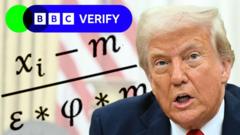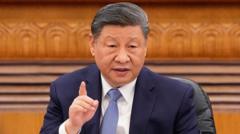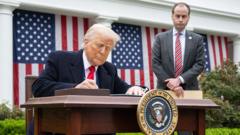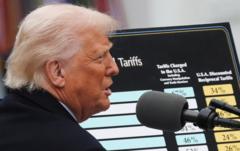The recent announcement of significant tariffs by President Trump is causing heightened tensions between the U.S. and its allies, signaling a shift in trade dynamics.
**Tariffs Spark Widespread Economic Tensions Among Allies**

**Tariffs Spark Widespread Economic Tensions Among Allies**
President Trump's new tariffs elevate concerns and reshape relationships with trading partners globally.
The recent announcement of substantial tariffs by President Trump has exacerbated tensions between the United States and its closest allies, leading to significant concerns over the future of trade. On April 2, 2025, Trump unveiled a plan described as “reciprocal,” which entails imposing new tariff rates on a multitude of countries. Most notably affected are key economies such as the European Union, facing a 20 percent tariff, and China, hit with an additional 34 percent on existing tariffs.
Economists fear that this dramatic shift marks the onset of a new protectionist era that could have profound implications on the global economy. Eswar Prasad, a professor at Cornell University, stated, “The scope and size of tariffs are both substantial and confirm the worst fears of the proponents of free trade.”
The changes, however, seem to spare Mexico and Canada, the latter being two of America’s largest trading partners, as they will not face any new tariffs beyond those already imposed under previous agreements, including the U.S.-Mexico-Canada Agreement (USMCA).
The newly introduced tariffs feature a baseline of 10 percent on all trading partners, excluding Canada and Mexico, alongside extra tariffs determined by reciprocal actions and trade barriers those nations maintain against U.S. exports. This latest development is part of a broader trade war that has been escalating over recent months, characterized by previous tariffs on steel, aluminum, and cars, in addition to threats of retaliatory measures on European goods.
As nations brace for the economic ripple effects of these tariffs, it is clear that Trump's latest measures are reshaping not only trade relationships but also the foundational dynamics of international commerce going forward.






















